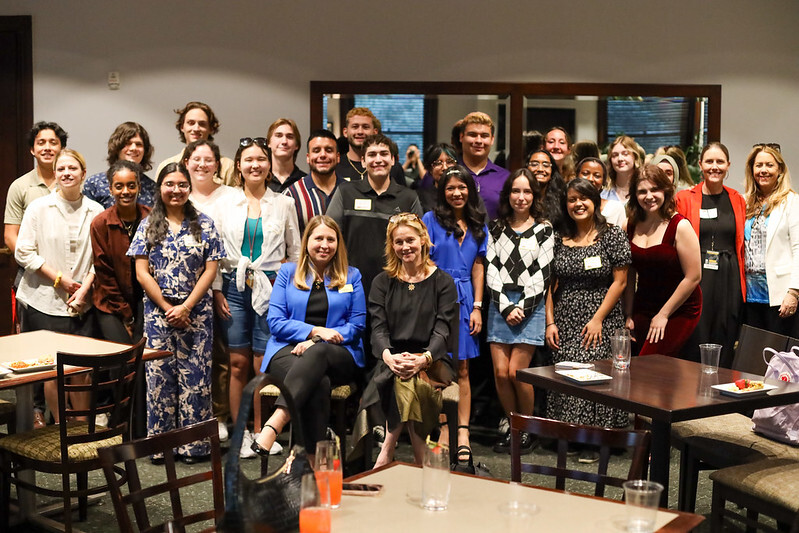Nagasriya Ramisetty is a Class of 2023 Flinn Scholar studying physiology and medical sciences at the University of Arizona. In October, she attended the ASU Centennial Lecture, which brings an influential scholar, artist, writer, or public figure to campus each fall. Before the public lecture, which is funded by an endowment awarded by the Flinn Foundation, the Flinn Scholars enjoyed an exclusive conversation with actress Laura Linney. Ramisetty writes about her experience below.
Having the opportunity to meet Laura Linney was an incredibly insightful one. To be entirely honest, I was not sure what to expect walking into the meeting room considering this was my first Arizona State University Centennial Lecture. The only thing that I knew going in was the Flinn Scholars would be having a private small-group discussion with an incredibly celebrated and well-known actress. The idea itself was surreal; I never expected to interact so closely with someone so esteemed in their field.
Despite all this, I was immediately put at ease as we began the conversation. Linney was a grounded person to talk to, incredibly well-versed in not only her subject matter, but intellectual matters regarding the arts and its application to real life. Our conversation began with the SAG-AFTRA strike and the place that the arts had in our world which is continually changing and growing. I was most interested in the conversation about AI replacing the work of actors over time. I had never really thought about the commercialization of the artistic process and the removal of human presence: what does that really mean for art in the future? How do we truly appreciate an artist in a world where we can re-create their work with the click of a button, or edit out the purposeful choices of the art’s creators?
Additionally, it was really insightful to learn more about her process as an actress and her creative method as she approaches her roles. The way that she dissects her characters is truly methodical. Acting wasn’t something that necessarily came naturally; rather it was a cultivated talent that came from work and effort. It was clear that her interest in the arts and this topic had not only shaped her in a professional sense but also affected how she saw the world through her own personal lens. I walked away from this discussion with the feeling that I could appreciate every day a little bit more if I took the time to truly appreciate the art that is an everyday part of life.
The arts shape us, mold us, represent us, and change with us. It is through art that we are confronted with some of life’s greatest questions and are forced to confront the complexities of our own identities. This lecture taught me that through art we reconcile what we value, what we appreciate, and what inspires the depth of our emotions. I don’t think I could ever listen to Mozart the same way after our conversation.
Being a STEM major, I was able to garner a new appreciation for the arts in further facilitating my personal and professional development. I realize that no field or discipline can operate within a vacuum. Rather, it is important to recognize holistically how multifaceted life is.
The Flinn Foundation provided me and all my fellow Flinn Scholars with such a unique experience of having a conversation with Linney. I cannot imagine that I ever would have had such a chance otherwise, and for that, I am forever thankful to the foundation for constantly providing me with the opportunity to broaden my horizons. I cannot wait to continue cultivating my appreciation for the arts over the next four years and throughout my life.




